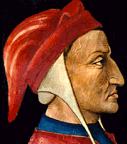
The Devil In Dante
The Divine Comedy is composed of three works, Inferno, Purgatory and Paradise. As Britannica says:
| This great work of medieval literature is a profound Christian vision of man's temporal and eternal destiny. On its most personal level, it draws on the poet's own experience of exile from his native city of Florence; on its most comprehensive level, it may be read as an allegory, taking the form of a journey through hell, purgatory, and paradise. The poem amazes by its array of learning, its penetrating and comprehensive analysis of contemporary problems, and its inventiveness of language and imagery. By choosing to write his poem in Italian rather than in Latin, Dante decisively influenced the course of literary development. Not only did he lend a voice to the emerging lay culture of his own country, but Italian became the literary language in western Europe for several centuries. In addition to poetry Dante wrote important theoretical works ranging from discussions of rhetoric to moral philosophy and political thought. |
Amongst other noteworthy accomplishments, is Dante's portrayal of Satan, comment upon which can be found here.